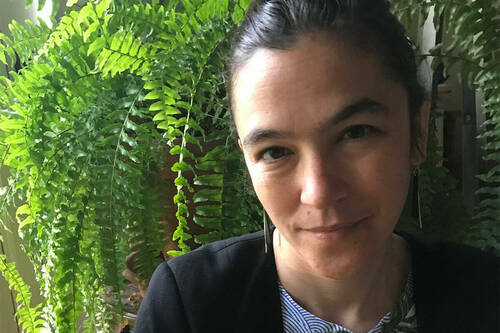
Joyelle McSweeney, a University of Notre Dame professor of English and Creative Writing Program faculty member, has been named a finalist for the Kingsley Tufts Poetry Award, a prominent prize honoring work by a mid-career poet.
The honor comes in recognition of McSweeney’s double poetry collection “Toxicon and Arachne” (Nightboat Books, 2020) — the first part written in the years leading up to the birth of her third daughter, Arachne; and the second part written in the spring following Arachne’s brief life and death.
“This double-book is like a double-self-portrait of my mind at its most exuberant and most dismayed, most centrifugal and most collapsed,” McSweeney said. “It reflects everything I've ever learned — though ‘everything I ever learned’ didn't help me when I needed it. It makes an engine from opposites, like all true poetry, and like the universe itself.”
Established in 1992 and based at Claremont Graduate University, the Kingsley Tufts Award both honors poets and aims to provide resources that allow them to continue working toward the pinnacle of their craft. Other finalists this year are Mei-mei Berssenbrugge, T’ai Freedom Ford, John Murillo and Tommy Pico.
“Toxicon” engages with Plato’s notion that writing must be distrusted because it is a poison and a cure. Containing McSweeney’s most formally ambitious poems, she said she wrote “works of such lyric intensity that they would feel almost like toxins, and to formally hone them like poison arrows.”
In the wake of her daughter’s death from an unexpected birth defect, McSweeney reflected on her poems’ thematic concerns with plagues, contaminants, mutations and unintended effects. She wrote the poems of “Arachne” over the span of a few weeks, as she took walks along the St Joseph River in South Bend, filled with anger and grief.
“Springtime returned to South Bend, but Arachne did not return with it,” McSweeney said. “It seemed that ‘Toxicon’ prophesized Arachne, but it's also true that Arachne rewrites ‘Toxicon’ by rendering it a work of prophecy. That's ultimately why the publisher and I decided to publish the two books together — because they co-author or almost co-gestate each other, bring each other to (dark) light.”
The author of six books of poetry and prose, many of which also contain plays, McSweeney won the inaugural Leslie Scalapino Prize for Innovative Women Playwrights for her 2013 play “Dead Youth, or, the Leaks.” With Johannes Göransson, she founded and edits Action Books, an international press for poetry and translation focused on modern and contemporary works from Latin America, Asia, the United States and Europe.
“The Kingsley Tufts prize is a major award that is designed to recognize and support a poet who is no longer at the outset of her career and yet still has many years of writing ahead,” said Jesse Lander, chair of the Department of English. “This makes the Kingsley Tufts prize truly distinctive, and the English department is very proud that Joyelle McSweeney is a finalist for this award.”
Originally published by at al.nd.edu on April 1.